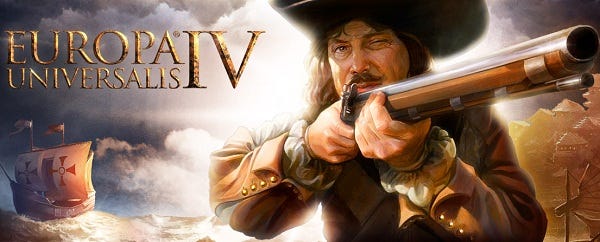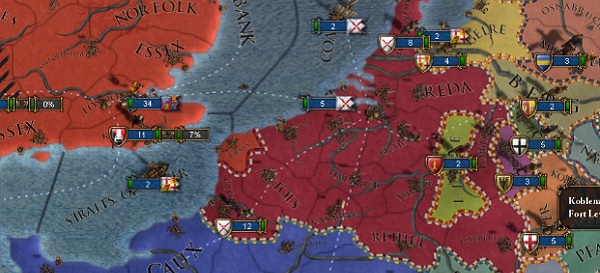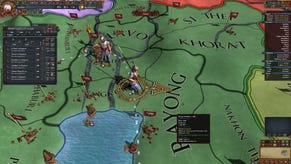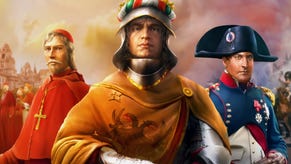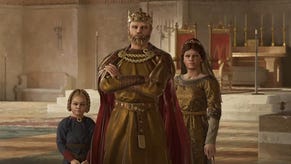Wot I Think: Europa Universalis IV
The Wealth of Nations
Although it's the fourth game in a well-respected series, Europa Universalis IV has been created in the shadow of Crusader Kings II, which unexpectedly but deservedly discovered a wider audience than its predecessors. As the next game from the internal Paradox Development Studio and a chronological sequel to CK II, EU IV has a weight of expectation upon it. The two games can even connect, covering almost a thousand years of history. Daunting, broad and deep, EU IV is more than equal to its burden. Here’s wot I think.
Here’s what you need to know. If you’re new to grand strategy games, EU IV is an excellent entry point. It’s a more directed experience than Crusader Kings II, providing clarity in terms of short- and long-term objectives without actively restraining the player. If you played CK II for the characters and plots, but aren’t sure whether the transition to a less personal politics will suit you, be assured that EU IV is equally gripping as a generator of narratives, and makes characters of its nations. And if you’re a veteran of the series, rejoice, because this is the strongest and most satisfying entry.
Europa Universalis IV is an enormous game, spanning centuries of history, the majority of the globe, and enough mechanics to fill a thousand pit-stops. I’ve spent more time with various pre-release versions than most games will take from me in a lifetime, and there are still entire areas that I’m yet to explore. I’ve barely touched America, for example, although I have forged an empire that cuts across the heart of Europe, with Scotland and Sweden as its twin crowns. I’ve also spent a lot of time watching as the majestic simulation that drives Europa’s alternate histories creates challenges and tales all of its own. If nothing else, EU IV is at least that rarest of treasures – a long-form strategy game that entertains and engages victors and victims alike.
The world is a playground full of varied apparatus, from the trade routes of Venice to the far-flung conquistadors of Castille, and no single playthrough will involve every toy. Despite the depth and breadth of the setting, EU IV isn’t as daunting and open-ended as it first appears. The player does have freedom to experiment, expand and expire as he/she wishes, but the experience can be far more directed than was the case in CK II, or even previous EU titles.
Core to the structural overhaul that has taken place since EU III is the existence of an extensive tree of National Ideas. These serve as the identifying qualities of a country, providing a sort of personality similar to character traits or skills in an RPG, and they also help to define that country’s destiny. In my first few attempts, I craved the short-term advantages of particular choices too much. That can be fine for a smaller country, carving out an unknown niche and hoping to survive from decade to decade, but my conversion of England into a military powerhouse, simply to cling onto territories during the dying days of The Hundred Years' War and to end the War of the Roses swiftly, proved unwise.
Because the game begins in media res, there’s a strong temptation to treat immediate problems as permanent problems. That’s not the case. England’s violent opening to the game is a sort of historical accident, and with the right approach and a decent set of National Ideas, constructing an Empire can be an altogether more peaceful affair. As soon as the line of succession has been established and the French have taken their pound of flesh, I found England’s role in the world best supported by naval, trading and diplomatic powers, patrolling and controlling rather than picking fights with neighbours.
My England will not be your England, and both of our reimaginings will deviate from history as time passes. With everything else stripped away, EU IV contains an excellent and robust suite of tools that cater for distinct play styles and will allow experienced players to excel. In that, it is a wholly different proposition to Crusader Kings II, which doesn’t allow for specialisation or the perfection of a style to anything like the extent that EU IV does. This game has missions, which are optional but provide guidance and structure, and almost every nation has some unique quality, whether geographical, scripted or designed, that provides strengths and weaknesses to exploit.
In Europa Universalis IV, I’m inclined to aim for some sort of grand victory, even though long-term objectives are entirely of the player’s creation. There’s a natural drive toward expansion and absorption, aided by the new monarch powers and overhauled rules governing envoys (colonists, diplomats merchants, missionaries). There is less emphasis on money than in previous iterations, meaning the AI is less likely to ruin itself. Inflation and crippling debt are less problematic for the player as well, which is a good thing, allowing for alternate solutions when desperation bites hard.
Envoys are now treated as individuals, active on the map as they go about their tasks. Their number is limited, but instead of running out of actions when money is tight, each specific character can only partake in one action at any time, so must be recalled if a new opportunity arises. This, like so much else that has been reworked in the foundations of the game, provides the player with more meaningful choices to make, and areas to priorities, at any one moment, rather than restricting them due to a lack of resources. One of the mantras behind the game’s design, and Paradox’ wider portfolio, is ‘complex but not complicated’. I’d add ‘less pressure and more possibilities’. EU IV is far from an easy game to grasp, its scope and scale demand a firm intellectual commitment, but it isn’t punishing. Mistakes don’t lead to ruin, and there is pleasure to be found in recovery and redemption.
As the latest instalment of Paradox Development Studio’s flagship grand strategy series, EU IV has a lot to prove. Crusader Kings II found a new audience, showing that people will take the time to learn the ins and outs of an initially overwhelming interface as long as the game within contains incest and fratricide. EU IV moves way from the dynastic storytelling and toward the broader strokes of nation- and empire-building, the mechanics and approach adapted for the period. It still creates stories and those stories still demand to be retold. I call over friends and flatmates, pointing at the changing colours on the map and explaining the previous half century of history, and how it has changed the shape of the world forever. Like a baseball game’s final box score, to the experienced observer, EU IV’s maps tell a complete tale, every conquest and colonist’s expedition leaving a mark.
Crusader Kings II took up more of my time last year than any other game, and every minute was happily spent. It’s continued that streak this year, taking prime position after the release of the Old Gods expansion. EU IV is almost certainly going to take its place, which is fitting, although I expect stiff competition from Rome II. The happy news is that historical strategy games can exist side by side, and nobody has to march under a single banner. The eagles of Rome and the nascent empires of EU IV can co-exist, each offering something different.
In the long-term, I strongly suspect that EU IV will continue to surprise. As with all of the games I admire and enjoy the most, it exists as a series of interlocking systems, each lending strength and variety to the others, and combining to form a simulation that’s almost as much fun to watch as it is to interact with. It’s the historian’s dream, an infinity of possible outcomes that can be outlandish but rarely feel unearned.
EU IV is a fascinating simulation, an alternate history generator, a narrative tool and an entirely successful redesign of a strong formula. It’s also a remarkably entertaining game, in some ways closer to its cardboard roots than it has been for more than a decade, although crunching an abundance of numbers as only a computer can. Volumes will be written about viable tactics for each nation and some of the discoveries will be unexpected, surprising even the developers. They have created a world in flux, though finely poised, and it is here, rather than in city-wide urban murder simulators, that gaming’s lofty drive toward emergence, living worlds and total player agency is best realised.
Solid multiplayer support isn’t the icing on the cake. It’s a separate cake containing more than a hint of fiery ginger. It’ll end up being the more enticing prospect for many players and with a good group, it’s a refreshing experience, full of betrayal and shock, and ending with friendships sundered and vendettas formed. Precisely my experience of ‘sharing’ a delicious cake.
Many more words on this soon, no doubt, including a conversation with the developers and thoughts on the save game convertor, which wasn’t available pre-release. I fully intend to start a game of CK II in the Old Gods period and forge a pagan empire that lasts well into the seventeenth century. Now’s as good a time as any. I’ll be back in a couple of hundred years.
Europa Universalis IV is available now.
